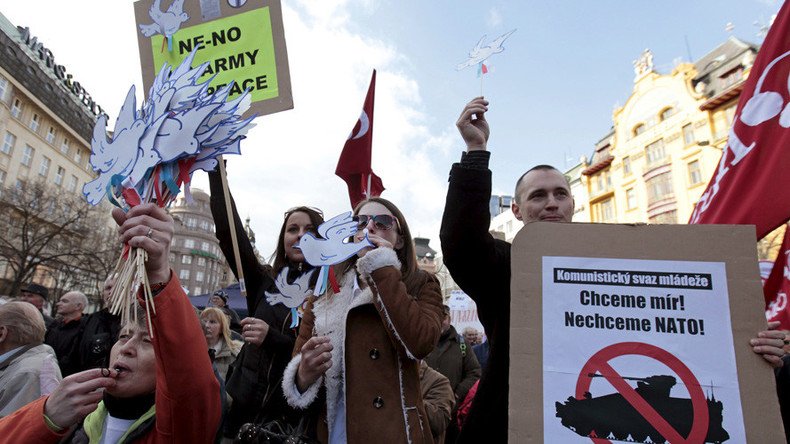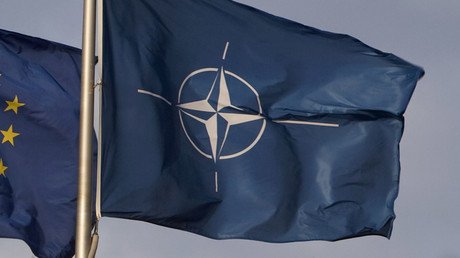‘Compared to Cold War times, NATO and EU now run by intellectual dwarfs’

The situation today is much more dangerous than in the days of the Cold War, because in those times the world had experienced politicians who understood what war was, said Jan Oberg, Director at TFF-Transnational Foundation for Peace and Future Research.
People all across Europe have been expressing their anti-NATO sentiment. For example, a Czech veteran recently performed a provocative protest and now faces up to 3 years in jail.
RT: NATO member states aren't all on the same page when it comes to naming threats. Why do you think that is?
Jan Oberg: Because they need it psychologically; they know that what they do now is wrong. They know that we promised [Mikhail] Gorbachev not to expand NATO. They know that they are having internal splits in the Western world, in the sense that you’ve just seen Brexit. The second largest military in NATO is falling off the EU. You’ve just had the Chilcot Report that undermines completely the largest war project in decades. You have Germany who has a NATO problem – it is not NATO that has German problem – because Germany has its history. Germany and Angela Merkel knows very well how dangerous this game is. That is also why a lot of other countries, which are not NATO members, including Finland and Sweden, are participating to some extent in this. If the next new member you can only find is Montenegro – 600, 000 people run by a family more or less corrupt, if not totally corrupt - it is not a strong alliance. But militarily yes; it is 12 times bigger in militarily expenditures than Russia. But politically, psychologically this is chest-beating from an alliance that knows that the time of the Western empire and strength is going down.
RT: If they know that the time and the power of the Western empire is going down, what exactly is NATO trying to achieve, because most people say what it is doing on Russia’s border is highly dangerous.
JO: It is highly dangerous. I can say that with 40 years of experience. It is much more dangerous than the old Cold War, because the old Cold War had experienced politicians, like Willy Brandt, Bruno Kreisky, and many others, who knew what war was. Today, we have intellectual dwarfs running NATO, and many other European states. They have no idea about conflict resolution, reconciliation, about dialogue, about confident-building measures – all the things we had in the old Cold War days is something that is missing completely today. The reason is if you look at all the power scales - there is economic power, political power, legitimacy power and all of that – what the West is very good at still, and second to none – particularly the US and NATO, as a huge alliance - is high-tech military – not moral issues, not courage, not the willingness to put boots on the ground and sacrifice some soldiers, but we are very good at technology, and have enough money poured into the military-industrial, media-academic complex.
But on the other scales we’re getting weaker; the empire is getting weaker and the economy is getting weaker. Look at the economy of Europe today. Our ability to treat human beings and refugees coming to Europe is falling apart. Brexit means that the EU is falling apart at some point – you can’t go like that. What we are very good at is what we use. If you have only one tool in your tool box that is the one you use at the moment, what we are strongest at – military, and it is deadly dangerous, because it could be read differently than I do it in Moscow.
RT: An alleged quote "Russian threat" is on the summit's agenda. How justified is such rhetoric?
JO: No it is not. The best military indicator that we have on military balance on all that – is military expenditures, and Russia’s military expenditures are 8 percent of NATO’s. So it is very dangerous for those who always said that balance and equal strength is a stabilizing power and force. Therefore, we should be very careful and I hope the Western citizens will rise and protest against the way they squander taxpayers money and undermine the security of Western and Eastern Europe. Remember that it is not the US that will pay for a war; it is us in Europe that will pay for a war. And I hope the wisdom in Moscow will be big enough to not do panicking things in this situation.
The statements, views and opinions expressed in this column are solely those of the author and do not necessarily represent those of RT.













